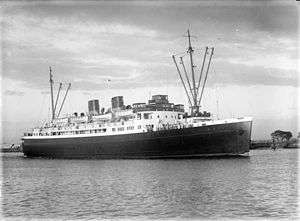Bass Strait ferries

Bass Strait Ferries have been the ships that have been used for regular transport across Bass Strait between Tasmania and Victoria,[1][2][3] as well as the various attempts to link Tasmania with Sydney.[4][5] Historically, some regular shipping services in the twentieth century linked Sydney, Melbourne and Hobart, with the Bass Strait ports: Launceston's various port locations, Devonport and Burnie. The distinction between coastal shipping and Bass Strait ferry has been blurred at times.
At various stages the cost of shipping between Tasmania and the Australian mainland have caused enquiries and calls for subsidies or reduced rates of both ferries and general shipping.[6][7]
History
In the 1840s the Launceston-Melbourne Steam Navigation Company was in business with Black Swan, Royal Shepherd and Havilah.[8] The Shamrock at this time was engaged in a service between Sydney, Melbourne and Launceston [9]
Tasmanian Steamers commenced in the 1920s with three ships.[10]
The Oonah (originally on the Sydney-Hobart route) was operated along with SS Loongana and Nairana until 1935 when Oonah and Loongana were replaced by the SS Taroona.
In 1959 the Australian National Line took over the service, and from 1959 to 1972, the Princess of Tasmania made crossings between Melbourne and Devonport. The cargo-only Bass Trader carried heavy vehicles from Melbourne to Tasmania until the Australian Trader was added in 1969 with services from Melbourne to Burnie, Devonport and Bell Bay (Launceston) in rotation.
From 1965 to 1972, the Empress of Australia made three crossings per fortnight from Sydney to Hobart, Bell Bay and Burnie. In 1972 the Empress replaced the Princess on the Melbourne to Devonport route and the Australian Trader moved to the Sydney-Tasmania routes.
The Tasmanian Government's TT-Line took over the service from 1985 when the Abel Tasman replaced the Empress and made six weekly overnight crossings between Devonport and Melbourne. It was replaced by the Spirit of Tasmania in 1993.
In the summer months of 1998 to 2002, TT-Line in conjunction with SeaCat Tasmania, also operated the high speed catamaran Devil Cat between Melbourne and George Town near Bell Bay. The trip took six hours.
In 2002 the Spirit was replaced with the two ferries previously owned by Superfast Ferries Spirit of Tasmania I and Spirit of Tasmania II, with two crossings each night leaving simultaneously from Melbourne and Devonport. From January 2004 to June 2006 a third ship, Spirit of Tasmania III, operated on the Devonport to Sydney route.
Flinders island can also be reached by ferry from Bridport in Tasmania, and from Port Welshpool in Victoria]].
Localities/Ports
Known ferry ships

(chronological)[11]
- Black Swan, Royal Shepherd, Havilah and Derwent (1850s to 1870s)
- Mangana and Flinders (1879 +)
- Pateena, Flora and Penguin (1880s)
- SS Burrumbeet (1889 +)
- SS Coogee (1890s)
- SS Pateena
- SS Rotomahana
- SS City of Melbourne[12]
- SS Oonah
- SS Loongana
- SS Nairana
- SS Taroona[13]
- MS Princess of Tasmania
- MS Bass Trader
- MS Empress of Australia[14]
- MS Australian Trader
- MS Abel Tasman
- MS Spirit of Tasmania
- HSC Devil Cat
- MS Spirit of Tasmania I
- MS Spirit of Tasmania II
- MS Spirit of Tasmania III
See also
References
- ↑ Loney, Jack (1982). In Bay steamers and coastal ferries. Reed, Sydney ISBN 0-589-50383-9
- ↑ Peter Plowman (2004) Ferry to Tasmania : a short history Dural, N.S.W. : Rosenberg Publishing. ISBN 1-877058-27-0
- ↑ Hopkins, David L. (David Lloyd) (1994). In The shipping history of the Bass Strait crossing : a brief history in pictures and text of the regular passenger ferries that criss-crossed Bass Strait at oft times a most notorious stretch of water. Taswegia, Devonport, Tas. ISBN 0646186353
- ↑ "SYDNEY TO TASMANIA FERRY POSTS US$32 MLN ANNUAL LOSS". AsiaPulse News. 2005-11-09.
- ↑ "Tassie scraps Sydney to Devonport ferry". The Age. 2006-05-05. Retrieved 2007-01-14.
- ↑ "TO ENCOURAGE TOURISTS.". The Mercury. Hobart, Tas. 10 August 1935. p. 11. Retrieved 26 July 2011 – via National Library of Australia.
- ↑ Demand for sea passenger transport between Tasmania and the Australian mainland, August 1980. Bureau of Transport Economics. Canberra : Government Printer, 1981. Parliamentary paper (Australia. Parliament) ; PP no. 366/1980. ISBN 0-642-06544-6
- ↑ Hopkins, David L.; Hopkins, David L. (1991), The golden years of Tasmania : from boom to almost bust and back again in the island state, Tasmania, St David's Park Publishing, ISBN 978-0-7246-2536-9 page 208 The Bass Strait crossing
- ↑ "BASS STRAIT STEAMER SERVICE.". The Mercury. CXIV (16,057). Tasmania. 20 April 1921. p. 4. Retrieved 19 March 2016 – via National Library of Australia.
- ↑ "BASS STRAIT STEAMER SERVICE.". The Mercury. CXIV (16,057). Tasmania. 20 April 1921. p. 4. Retrieved 19 March 2016 – via National Library of Australia.
- ↑ Hopkins, 4th edition, 2003
- ↑ Broxam, Graeme (2008) The Bass Strait Ferry "City of Melbourne" : pioneer Australian screw steamship Hobart, Tas. : Navarine Publishing, ISBN 978-0-9751331-3-2 (pbk.)
- ↑ Plowman, Peter (1989). The career of the Taroona. -The Bass Strait ferry, built in 1934-. In Australian Sea Heritage. (23), 10-11,13.
- ↑ Port of Launceston Authority (Tas.) & Thompson Clarke Shipping Consultants (1982). In Replacing the "Empress" : abridged proposal for a Bass Strait ferry service between Melbourne and Bell Bay. the Authority, [Launceston]
External links
- "Bass Strait Passenger Ships and Passenger/Vehicle Ferries". users.nex.net.au.
- "Flotilla Australia". flotilla-australia.com.
.jpg)